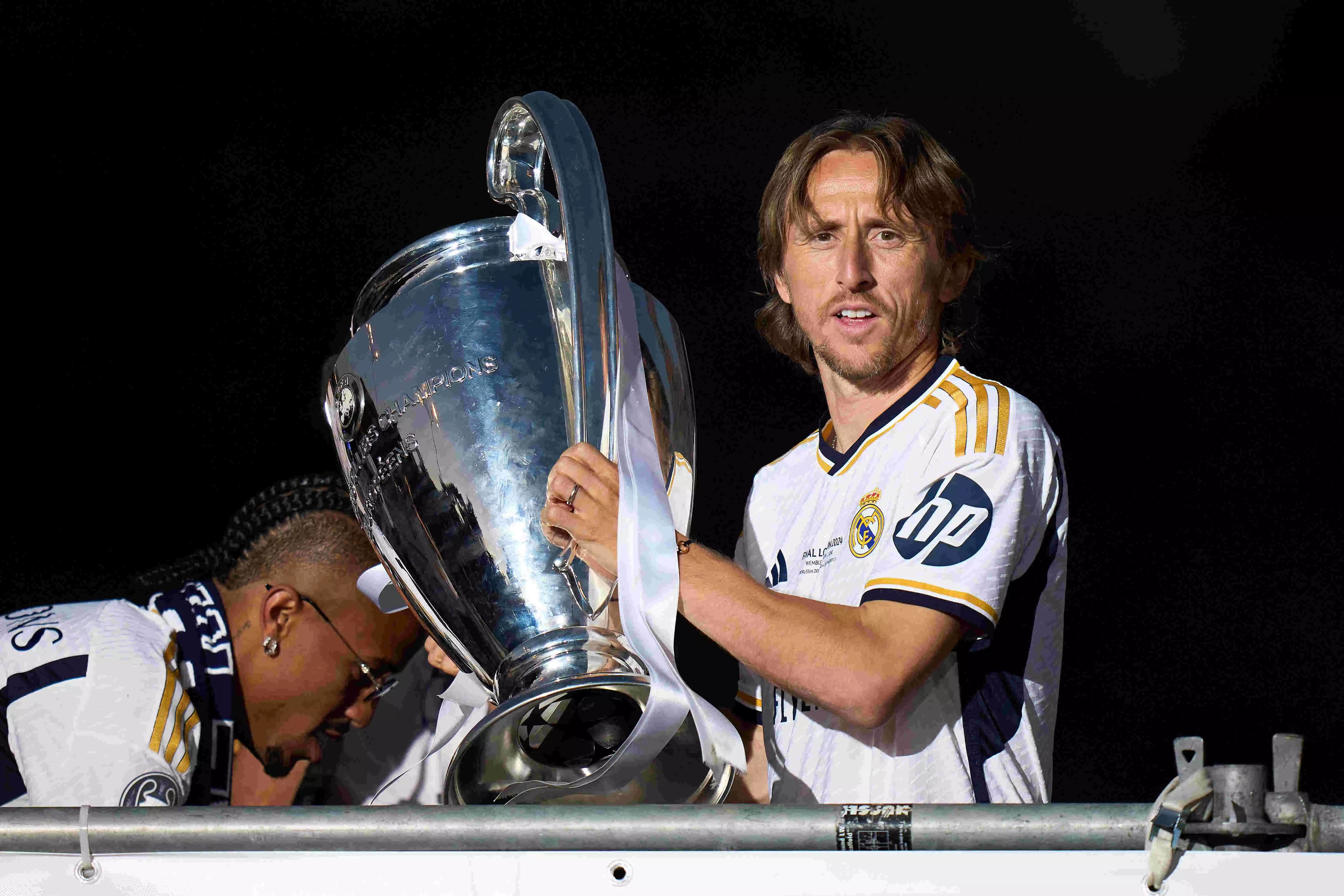Madrid’s Midfield Magician
A remarkable era in Real Madrid’s storied past is drawing to a close as Luka Modric’s 13-year tenure — marked by sublime skill, unwavering dedication, and an unshakable belief — quietly and gracefully comes to an end

"Thanks for everything, Luka! It was an honour to share so many moments with you at the club. Good luck in what’s to come!"
CRISTIANO RONALDO
"You’ve always been one of the best players of all time, but you’re a wonderful person."
KYLIAN MBAPPÉ
"An exceptional player with footballing and human qualities, a person I am proud to call a friend. The floodlights of the Bernabéu will never be switched on again to see you on the pitch, but in the history books of Real Madrid, You will always be one of the greatest."
SERGIO RAMOS
By the time this story is published, Luka Modrić would have already bid farewell to Real Madrid. Over the 13 seasons at Santiago Bernabeu, Modrić transformed from a promising talent into a symbol of excellence and resilience, leaving an indelible mark on the club and the sport. Luka Modric, the Croatian maestro and one of the most decorated players in Real Madrid’s fabled history, will say goodbye to that club which defined him as much as he dignified it in the same coin. The news of Modric hanging his boots signals the end of a chapter that has combined grace with grit and unshakable belief — a journey that started in 2012 and turned into a saga of brilliance that very few in football can match.
Born in the war-torn streets of Zadar, Modric’s earliest experiences in football were not so different. Adversity was his constant companion on the field, not in the form of war but in other players’ whispers about his diminutive size. It wasn’t the death knell to his passion; rather, it fanned his desire’s embers into a blaze. He would come to be known as that refugee kid who bought into football in bleak times, making fantasies wiggle their way through scorched parking lots and provisional shelters. This is the fairy tale of turning from a boy kicking tin cans in the refugee hotel’s vacant parking lot into a star so bright that it illuminates the floors of the best clubs in the world. Modric joined Real Madrid during the summer of 2012 from Tottenham Hotspur, a signing that many initially doubted. How could so little an unprepossessing playmaker bear the weight of expectation at a club so overstuffed with Galacticos and gladiatorial demands? It didn’t take long for Modric to make his doubters eat their words. His first season was an adaptation interspersed with moments of sheer genius; he’d arrived at a club in transition, but his element in the middle of the park brought that stability and finesse, which later became the hallmark of Madrid. The hub of his contribution was never just in goals or assists, though he went to 43 goals in 590 outings, eighth in Madrid’s storied annals, but in the intangible magic he wove with every touch. It was like poetry in motion, modest finger movements, passes measured to a fraction of an inch, and deft turns bamboozling despairing defenders. His football was art, drawn with the brushstrokes of vision and grace. But behind that artistry lay a steely resolve and tireless work ethic that endeared him to teammates and fans alike.
In his 13 years at Real Madrid, Modric was the metronome of the team, orchestrating play with the precision of a master conductor. He was central to the club’s golden age, winning 28 major trophies that included six European Cups — making him one of only five players in the club’s 122-year history to reach that milestone. Alongside those European crowns, Modric lifted six Club World Cups, five European Super Cups, four La Liga titles, two Copas del Rey, and five Spanish Super Cups. His role in these triumphs was never peripheral; he was the beating heart of a team that redefined what it meant to be great.
It was in 2018 when he doubled down on club affiliation, transcending it all to become a universal embodiment of football excellence. Modric’s performance for Croatia during the World Cup in Russia was inspirational, guiding his countrymen to a stunning final against France. Croatia didn’t win, but with Modric’s vision and leadership, he secured the Golden Ball, which is without a doubt the highest personal award of the tournament. That was also the year Modric broke Messi and Ronaldo’s undivided reign of duopoly, winning the Ballon d’Or—a crowning moment for him and solidifying his undoubted status as one of the game’s legends. While at Real Madrid, his impact was felt far beyond the numbers, as he was the eye of the storm, the player who found space and the pass when there was none and most importantly, was calm amid all the chaos. Amidst the tightest of Champions League knockout ties, he stood head and shoulders above the rest. In the final third, he unlocked defences effortlessly with an exquisite flick of his right boot, a signature move of his style. In the defensive third, he tirelessly fought and pressed like a player who took nothing for granted.
His partnership with Toni Kroos and Casemiro in midfield became one of the most formidable in football history, a triumvirate that balanced industry and artistry with unparalleled harmony. Together, they formed the foundation upon which Real Madrid’s modern empire was built, blending youth and experience, steel and silk. Even as the years caught up with him, Modric adapted his game, shifting from tireless dynamo to wise sage, always finding ways to influence matches and mentor younger teammates.
Modric’s contribution has never ceased as Ancelotti reduced his minutes. Even in his last season, he managed to maintain a southern border mark of 3,000 minutes of recorded activity. This achievement is yet another display of his professionalism and skill. Club president Pérez stated, “Luka Modric will forever remain in the hearts of all madridistas as a unique and exemplary footballer who has always embodied the values of Real Madrid” and this phrase is true for millions. Indeed, Modric’s name is now etched alongside legends—Di Stefano, Zidane, Raul—not just for his trophies, but for the purity of his game and the dignity.
Modric’s departure from Real Madrid does not signal the end of his footballing journey. His recent investment in Swansea City Football Club suggests a future that remains linked to the sport that has given him everything and to which he has given even more. Whether he takes on a role as mentor, or advisor, or even returns to the pitch in a new guise, his love for the game remains undimmed. This next chapter is yet to be written, but if his past is any guide, it will be marked by humility, passion, and an unyielding commitment to excellence. Luka Modric will not just be remembered as a player who won trophies; he will be remembered as the player who taught us that football is more than a game. It is a story of hope, of dreams, of the triumph of the human spirit. And Luka Modric’s story will live on, forever etched in the hearts of those who watched him turn every match into a masterpiece. Farewell, maestro. You will never be forgotten.
Gracias, Luka!



